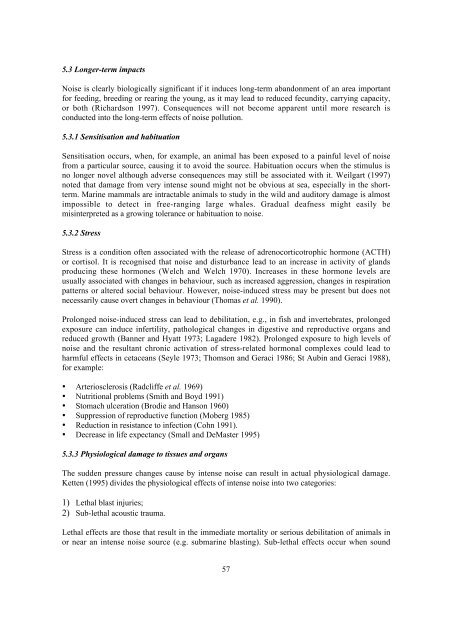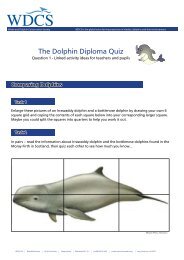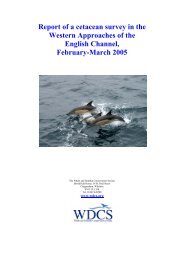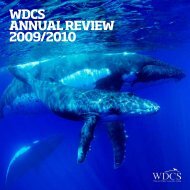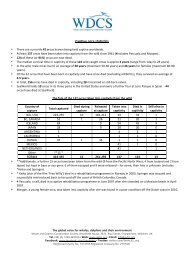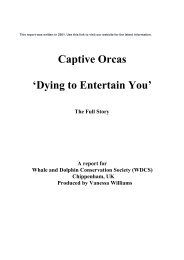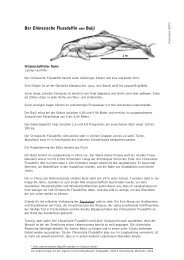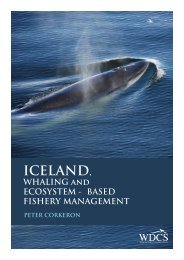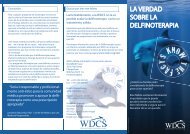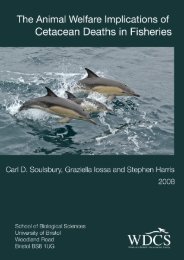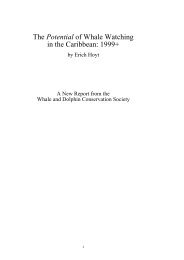Oceans of noise - Whale and Dolphin Conservation Society
Oceans of noise - Whale and Dolphin Conservation Society
Oceans of noise - Whale and Dolphin Conservation Society
You also want an ePaper? Increase the reach of your titles
YUMPU automatically turns print PDFs into web optimized ePapers that Google loves.
5.3 Longer-term impacts<br />
Noise is clearly biologically significant if it induces long-term ab<strong>and</strong>onment <strong>of</strong> an area important<br />
for feeding, breeding or rearing the young, as it may lead to reduced fecundity, carrying capacity,<br />
or both (Richardson 1997). Consequences will not become apparent until more research is<br />
conducted into the long-term effects <strong>of</strong> <strong>noise</strong> pollution.<br />
5.3.1 Sensitisation <strong>and</strong> habituation<br />
Sensitisation occurs, when, for example, an animal has been exposed to a painful level <strong>of</strong> <strong>noise</strong><br />
from a particular source, causing it to avoid the source. Habituation occurs when the stimulus is<br />
no longer novel although adverse consequences may still be associated with it. Weilgart (1997)<br />
noted that damage from very intense sound might not be obvious at sea, especially in the shortterm.<br />
Marine mammals are intractable animals to study in the wild <strong>and</strong> auditory damage is almost<br />
impossible to detect in free-ranging large whales. Gradual deafness might easily be<br />
misinterpreted as a growing tolerance or habituation to <strong>noise</strong>.<br />
5.3.2 Stress<br />
Stress is a condition <strong>of</strong>ten associated with the release <strong>of</strong> adrenocorticotrophic hormone (ACTH)<br />
or cortisol. It is recognised that <strong>noise</strong> <strong>and</strong> disturbance lead to an increase in activity <strong>of</strong> gl<strong>and</strong>s<br />
producing these hormones (Welch <strong>and</strong> Welch 1970). Increases in these hormone levels are<br />
usually associated with changes in behaviour, such as increased aggression, changes in respiration<br />
patterns or altered social behaviour. However, <strong>noise</strong>-induced stress may be present but does not<br />
necessarily cause overt changes in behaviour (Thomas et al. 1990).<br />
Prolonged <strong>noise</strong>-induced stress can lead to debilitation, e.g., in fish <strong>and</strong> invertebrates, prolonged<br />
exposure can induce infertility, pathological changes in digestive <strong>and</strong> reproductive organs <strong>and</strong><br />
reduced growth (Banner <strong>and</strong> Hyatt 1973; Lagadere 1982). Prolonged exposure to high levels <strong>of</strong><br />
<strong>noise</strong> <strong>and</strong> the resultant chronic activation <strong>of</strong> stress-related hormonal complexes could lead to<br />
harmful effects in cetaceans (Seyle 1973; Thomson <strong>and</strong> Geraci 1986; St Aubin <strong>and</strong> Geraci 1988),<br />
for example:<br />
Arteriosclerosis (Radcliffe et al. 1969)<br />
Nutritional problems (Smith <strong>and</strong> Boyd 1991)<br />
Stomach ulceration (Brodie <strong>and</strong> Hanson 1960)<br />
Suppression <strong>of</strong> reproductive function (Moberg 1985)<br />
Reduction in resistance to infection (Cohn 1991).<br />
Decrease in life expectancy (Small <strong>and</strong> DeMaster 1995)<br />
5.3.3 Physiological damage to tissues <strong>and</strong> organs<br />
The sudden pressure changes cause by intense <strong>noise</strong> can result in actual physiological damage.<br />
Ketten (1995) divides the physiological effects <strong>of</strong> intense <strong>noise</strong> into two categories:<br />
1) Lethal blast injuries;<br />
2) Sub-lethal acoustic trauma.<br />
Lethal effects are those that result in the immediate mortality or serious debilitation <strong>of</strong> animals in<br />
or near an intense <strong>noise</strong> source (e.g. submarine blasting). Sub-lethal effects occur when sound<br />
57


